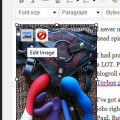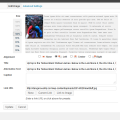#Accessibility
I’m definitely not an expert on this topic, I just wanted to share what little I’ve learned in case it might help others.
Accessibility. If you have all your limbs, if you can walk and run with ease, if you can see relatively well with or without glasses, if you can speak without assistance, if you can hear without major problems…..you probably don’t think about accessibility as often as you should. It’s easy to have those blinders on. Easier still if you do not know anyone deaf, blind, handicapped. At my first conferences it was a little tough for me to remember to face certain people when I spoke to them, and I screwed up sometimes. Luckily they’re not afraid to speak up and remind me to look at them, and then repeat myself.
If you’re able-bodied and don’t know anyone who isn’t, it’s sadly too easy to forget about accessibility. I try, I do, but I don’t get it as well as I could. Yesterday I learned something new. A reader, Amanda, sent me this awesome note:
Hi Lilly,
I just wanted to let you know how much I appreciate your blog. I am blind, and I really appreciate the thoroughness of your reviews, as well as the absence of bullshit. Also, I don’t know if you intentionally made your blog redesign accessible with a screenreader, but it is, and I was pleasantly surprised. Often, when people redesign their websites, accessibility is the last thing on their minds, and I find myself no longer able to read something I used to enjoy. Definitely NOT the case with your redesign, and that’s just fantastic as far as I’m concerned. Also, I can’t even begin to tell you how much I appreciate the fact that you almost always put descriptions of pictures you post in the images’ alt text. It’s so helpful.There wasn’t really much of a point to this email. I just wanted to let you know how helpful your blog is to someone who can’t see pictures and who has to depend on the overblown ad copy when shopping for toys. So… thank you. :)
Screen readers. I knew in theory that they exist, but I knew nothing about them. Scratch that, know nothing. I’ve never seen one in action. I don’t know the tech. All I know is that this magical thing can look at a website and read it out loud. Usually. The problem apparently is compatibility. While I don’t have all the info yet, Amanda said:
The problem is that there are several different screen readers, and not all of them support the same things. For example, I use a Mac and its built-in screen reader, VoiceOver. Until very recently, VO and the Mac browser, Safari, didn’t support the Disqus comment system, whereas JAWS (a Windows-based screen reader) always supported Disqus.
But how do we know if a blog theme or site design is screen reader compatible? You can go the long route and utilize some of the sites and tools I have listed at the end, but accessibility to screen readers is just not a feature that gets mentioned when you’re looking at the technical info on a theme. I hope that someone can educate us in the comments of this post. I’m thrilled that the WordPress theme “Suffusion” is so accessible1. It’s not the only aspect to work on, though. When Amanda was mentioning the “alt text”, it’s something you do manually one of two ways. The first is by clicking on the “Edit Image” button if you’ve already inserted the image into the WYSIWYG editor portion of WP. The second is manually typing it in. The following code is for an image.
Here are screen shots of what I was talking about with the alt text, too:
Here are a few links that might help if you’re interested in making your blog more accessible to screen readers and beyond.
I hadn’t even seen Robin’s post until after I’d heard from Amanda and written most of this, so it’s great timing. Robin, a great blogger/educator/reviewer, is going to be presenting at CatalystCon in a few weeks and talking about accessibility. She makes her points about access being not JUST for those needing a screen reader, but other sorts of disabilities. While I’m not hearing impaired enough / in the right way to be able to use a hearing aid (yet), I am hard of hearing to a degree. I come across SO many podcast and video posts that I cannot use because I can’t understand what they’re saying. A transcript would go a long way. So instead, I miss out on the information because I don’t even bother to try listening anymore. I may be able to understand half of it, which is more than others who have more hearing loss than me. It’s not an uncommon disability, yet it’s common for podcasters and vloggers to forget it. I’m sure it’s not easy work, but could do an mturk for someone else to transcribe it and the results mean that more people can access your information. Win, no?
Accessibility is making sure that people aren’t left out. It requires effort on our parts, but why wouldn’t you if you know how? You’d want it done for you if you were in their shoes. Also? The fact that no bullshit = more accessible is a giant fucking WIN.
UPDATE: I wanted to add in some choice quotes from those who were able to attend Robin’s session on accessibility at Catalyst, as they apply to blogs/sites.
Captchas are usually no good for visually impaired. You can use a variety of authorizations that are easier to navigate. #cconaccess
— Del (@Wylddelirium) March 15, 2014
The screen reader will read the "alt text" of an image, the more detailed the better @RobinsToyNest #ccon #cconaccess
— Bex (@BexTalksSex) March 15, 2014
Sites with heavy Flash content, or buttons, can create havoc for screen readers. #cconaccess
— Del (@Wylddelirium) March 15, 2014
Simple English – less complex sentences & vocabulary increases accessibility. @RobinsToyNest #ccon #cconaccess
— Annamarie (@KinkySexyGeeky) March 15, 2014
Didn't make it to #cconaccess ? There's some great resources available here: http://t.co/DIhiMFlJm4
@RobinsToyNest #ccon
— Bex (@BexTalksSex) March 15, 2014
- For the record, my previous theme was, too, but Amanda’s point was that she encounters changes in design too often that negatively impact her ability to read it. My last theme was Glow from ElegantThemes.com. ↩









“A transcript goes a long way.”
YES! A THOUSAND TIMES YES!
Another reason to post transcripts: Non-native English speakers. Not everyone reading your blog has a firm enough grasp on the English language to follow a video with lots of speaking (especially if the speaker has an accent, talks fast, or uses idioms).
On a personal level, I prefer transcripts and written word because I have a difficult time following spoken lectures and monologues. I have a much easier time digesting information when I can read it at my own pace, so I very rarely watch video reviews or tutorials unless I’m specifically looking for a visual demonstration. It’s so disheartening to click on a promising link only to find that it’s just a video. That’s when I leave the website.
Transcripts rock. I’m not disabled, but I have a limited number of hours in my day. Watching someone slowly burble their way through a half hour video is rarely a good use of my time, and if they don’t have it together enough to provide a transcript the odds drop even further. Anything you can say clearly in half an hour I can read in five minutes or less. Very few vloggers/podcastrixes are so amazingly special that I’ll willingly spend the extra 25 minutes just to see them or hear their voices. The exceptions are where, like good television, the accompanying visuals are the whole point. Talking heads? No so much.
Not to mention that most ad-blocking/anti-tracking software kills disquis and often it’s not even obvious that there are comments.
UGH YES. VERY good point. Accents make it even more difficult for me to understand.
Wait, did you say ad-blocking software kills Disqus?
Great post. If you have any more questions about accessibility, feel free to email me. I don’t know even close to everything, but I’m more than willing to help in whatever way I can.
Ghostery does, which is anti-tracking rather than ad-blocking per se. I get the ghostery “allow once” / “allow” icons, which I have to click to see the comments at all. Disquis seems to be entriely dynamic HTML, which may be why most screenreaders just give up on it. Letting it run then scraping the resulting output is a fair bit of work.
For a sighted reader, this site is fairly busy and a little box with a couple of light blue spam icons in it doesn’t stand out. If I hadn’t read your post via RSS and gone “hey, it’s not just disabled people, unless lack of time is a disability” and wanted to comment, I probably wouldn’t have bothered jumping through hoops to reply.
More generally “track everything I do on the internet and sell that info to anyone who wants it” is not a model I support, or am happy about. The Disqus model is that they want you to use one identity, supplied by them, everywhere you go. They get that from every site that uses disqus, obviously, but also from any linked trackers (and there’s a lot of sharing going on amoungst the trackers). I realise you need the money, so you sell my details, but I’d rather you didn’t.
Interestingly I see quite a lot of your ads here, I suspect you host them yourself and none of your readers have gone to the effort of adding them to the block lists used by any of the blockers.
Ok hold up.
First, the line “I realise you need the money, so you sell my details, but I’d rather you didn’t.” makes no sense to me. I don’t get money for using Disqus. I’m not selling your details. I’m not really sure where you got that.
Second, there’s not a lot of ads. In fact, they’re few and far between. I have a few site sponsors, but they’re a simple text or banner link, there’s no scripts or tracking.
I’m truly baffled as to what ads you’re talking about.
I decided to use Disqus because it’s a better commenting system than the basic WordPress stuff. The features allow for more discussion.
I have no idea what you’re talking about. It’s like we’re in a different reality than you. She doesn’t get paid to use Disqus and neither do I on my blog. And she has minimal advertising on this site. You sound a little paranoid about Disqus.
I think disquis makes money by tracking users. How do you think they make money?
The adage “if you’re not the customer you’re the product” applies – either you’re paying them, or they’re selling what you give them. I assume you’re not paying them. What you give them is details of every user that loads the Disqus comminting setup. You may not be getting a cut of the money they make by selling that information, but you’re definitely sending it off. Apparently all you get is a commenting system, and that works for you.
The ads I see are all your referrer links and stuff in a column down the right hand side. There’s at least two “support my site” boxes with images in them, for example. I don’t object to them, and in fact I was intending that as a positive comment that none of your users are sufficiently offended by them to block them.
“the features allow for more discussion” is something I don’t see, because this is the first time I’ve ever loaded the Disqus system. In other words, a lot of people don’t see the comments. Every Ghostery user, for starters.
Dizzygirl, I’m sorry that Lilly allows ableist slurs and personal abuse.
They can’t block anything because there is nothing blockable. The things you think are ads are images or links with no cookies or tracking, and do you no harm. There are a total of 3 “ads” on the sidebar, all clearly marked and in one small spot. The affiliate links are just that. Nothing sinister going on here.
What? Why? Because I said you sound paranoid? That was neither a slur or abuse. It was an observation. Calm down. Nobody here is collection your data and selling it to anyone. Those ads you’re talking about aren’t the kind of ads you think they are.
So maybe I missed it but just what is it that makes this new theme accessible? The alt text?
Also, this might seem relevant, but I just found a neat tool to view websites as people with color blindness view them.
I hate that I take everything I have for granted… I never thought about this aspect of blogging. Thank you so much for providing this and educating us about this topic. I’ll need to go check out if my site is accessible.